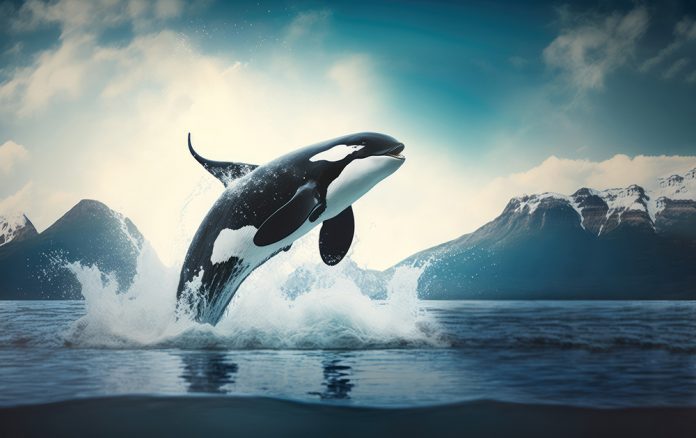Up to 20,000 whales are killed every year by ships. Tech company Orca AI uses advanced military techniques to help keep global waterways – and potentially marine life – safer and sustainable.
Founders Yarden Gross and Dor Raviv became friends while serving in the Israeli navy.
After leaving service, Yarden studied at university in Tel Aviv before founding a tech startup. Dor, meanwhile, extended his Navy service as a professional commander during which time he wrote an IDF training handbook for operating autonomous vessels, with input from Air Force and aerospace experts. On leaving the navy he studied electrical engineering and industry and management.
He then worked with startups to help develop both a face recognition system and a product allowing visually impaired people to read texts and recognise faces. This led to him becoming an expert in the field of computer vision.
Dor and Yarden renewed their friendship in 2018, and talked a lot about the profound impact autonomy, AI and computer vision were having on the mobility, satellite, and aviation industries.
At the time there was a lot of hype especially around autonomous cars. Yarden and Dor began to wonder if it was possible to create something similar for commercial shipping.
The idea stalled for a while, and Yarden took some time off surfing in Indonesia. Watching the heavy ship traffic off the coast there, he had the idea to bring autonomous capabilities to commercial shipping. On return to Israel, his first call was to Dor because he remembered his work on unmanned vessels in the navy.
Their friendship morphed into a business collaboration and the birth of Orca AI four years ago.
While full autonomy for ships is some way off, the company developed a digital ‘watchkeeping’ platform that is currently being utilised by some of the world’s leading shipping companies – with additional spin-off benefits for the environment.
How Orca AI works
The system uses computer vision and AI to relieve vessels from sole dependency on human lookouts and provide office staff with actionable insights. It provides an automated watch keeper to empower crews in complex navigation scenarios like congested waters, bad weather and low visibility.
An office-based dashboard helps fleet managers and operators to better understand voyage performance and identify unsafe, risky or inefficient behaviours more easily.
Unique technology
Orca AI says it has the largest maritime visual data set in the world (equalling 200 years of sailing across the world).
The company adds that no other systems are currently available which provide such accurate detection and categorisation of objects for vessels, especially in low-visibility conditions and at night.
The risk of collision with sea life
It is estimated that thousands of whales die every year from ship strikes, on top of the anthropogenic risks that whale populations are already facing, including habitat loss, climate change, and pollution (including plastic debris, fishing gear, etc.).
Orca AI stresses that documenting the exact number of whales killed or injured globally due to ship strikes is challenging due to factors such as under-reporting and regional variations.
However, the International Whaling Commission (IWC) estimated in 2019 that approximately 20,000 whales are killed each year worldwide due to various human activities, including ship strikes. This includes both intentional whaling and accidental deaths from ship strikes and other causes.
The impact of ship strikes on whales is devastating. Whales play a vital role in marine ecosystems, and their loss can disrupt food chains and ecosystem balance. Ship strikes also have an economic impact on whale watching tourism.
Preventing potential strikes
Yarden explains, “Helping to prevent collisions with whales is a fantastic environmental bonus for our technology in terms of mitigation measures to protect whales. Although not part of our original use case analysis, it was a customer sailing in speed-restricted Canadian waters that first approached Orca AI about whale detection. The platform has detected whales on several occasions and prevented potential strikes.
“In the absence of maritime regulations that specifically mandate whale detection capabilities, as part of our business model we will cater to demand from shipping companies that want to implement such capabilities. While we certainly promote and encourage it, we cannot of ourselves manufacture this demand.”
Sustainable support
Orca AI says it is proud of its mission to make navigation safer and prevent accidents that could lead to major oil and/or diesel spills, as well as pollution by hazardous cargoes.
Yarden adds, “Our platform is helping to reduce harmful emissions every day. Our recent analysis found that the Orca AI platform reduced potential incidents and collision events by more than 25% for 100-plus customer vessels in 2022, including tankers, container ships, Ro-Ro vessels and bulk carriers.
“We calculate that the resulting reduction in sharp manoeuvres (26.9%) and extreme drops in speed (18%) delivered a total of over 66,000 tonnes of CO2 emissions, helping customers meet their sustainability goals as well as supporting compliance with the new Carbon Intensity Indicator (CII) regulation.
“As for the future, as the shipping industry gradually decarbonises and new sustainable fuels are adopted, our platform can make an important contribution to increasing safety and maintaining environmental integrity.
“The number of incidents and collisions that take place every year, which to a certain extent is regarded as ‘business as usual’ today, cannot continue at current levels given the risks to seafarers, assets and the marine environment. This is particularly the case with ammonia, where accidental leaks of the highly toxic gas could prove extremely dangerous both to humans and marine life. (Ammonia is expected to cover 45% of energy demand from shipping in line with meeting 2050 decarbonisation targets).
“As the platform evolves with added functionality in future, including potentially voyage optimisation recommendations based on wind, wave and current forecasting and other parameters, its green credentials will also increase due to the operational efficiencies gained.” (Fuel and emissions saved from optimal planning of the vessel’s route and speed).



